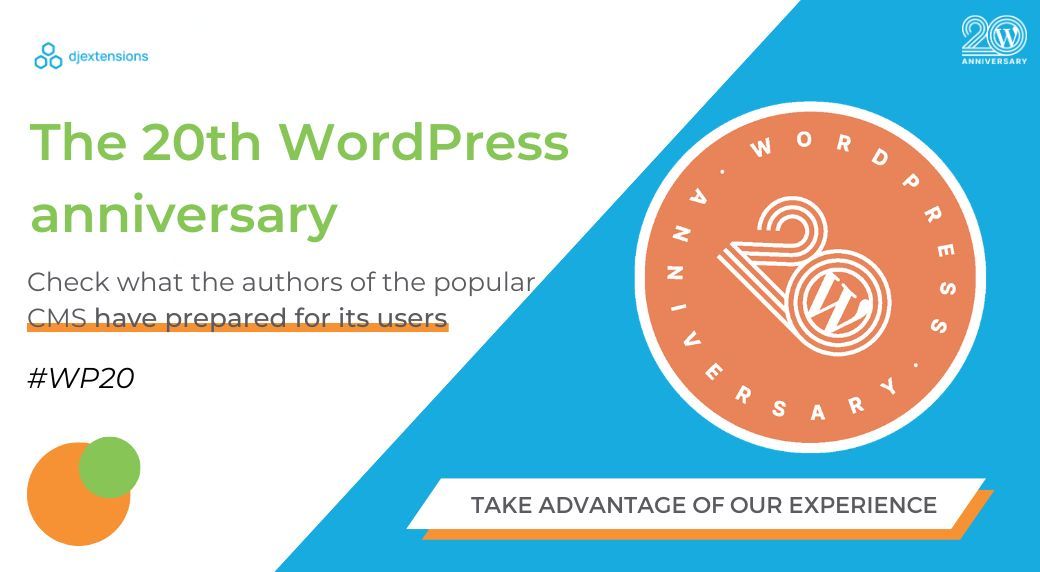
The 20th WordPress anniversary. Check what the authors of the popular CMS have prepared for its users
WordPress is a free and open-source content management system (CMS) that powers over 40% of all websites on the internet. It was first released on May 27, 2003, by Matt Mullenweg and Mike Little as a fork of an existing blogging software. Since then, WordPress has grown into a powerful and versatile platform that can be used for anything from blogs and personal websites to e-commerce stores and corporate portals.
This year, WordPress is celebrating its 20th anniversary, marking two decades of growth and innovation. What started as a small project by two developers has become a massive community of millions of users and developers around the world. Over the years, WordPress has evolved from a simple blogging platform to a full-fledged CMS that can handle complex websites with ease. Let's take a look at the history of WordPress and how it has evolved over the past 20 years.
History of WordPress
WordPress began as a fork of an existing blogging software called b2/cafelog. Matt Mullenweg and Mike Little decided to create a new version of b2/cafelog in 2003, and they called it WordPress. The first version of WordPress, 0.7, was released on May 27, 2003.
The early versions of WordPress were primarily used as a blogging platform. However, over time, it grew into a full-fledged CMS that could be used to build a wide range of websites. In 2004, WordPress introduced themes, which allowed users to customize the look and feel of their websites easily.
In 2005, WordPress introduced plugins, which enabled users to add new features and functionality to their websites without having to write any code. This was a game-changer for WordPress, as it allowed users to extend the functionality of the CMS without having to rely on developers.
In 2008, WordPress released version 2.5, which introduced a redesigned administration panel and a new dashboard. This update made it easier for users to manage their websites and added a more modern and polished look to the CMS.
Over the years, WordPress has continued to evolve and improve. In 2010, WordPress introduced custom post types, which allowed users to create different types of content beyond blog posts. In 2011, WordPress released version 3.0, which introduced a new default theme, Twenty Ten, and added support for custom menus.
In recent years, WordPress has focused on improving its core functionality and making it more accessible to users. WordPress 5.0, released in 2018, introduced the new Gutenberg editor, which made it easier for users to create complex layouts and add multimedia content to their posts and pages.
Today, WordPress is a mature and robust CMS that is used by millions of websites around the world. It has come a long way since its humble beginnings in 2003, and it shows no signs of slowing down.
Celebrating the 20th Anniversary
To celebrate the 20th anniversary of WordPress, the authors of the CMS have prepared a range of events, offers, and new features for its users.
One of the most exciting events is the 20th anniversary virtual conference, which will be held on May 27, 2023. This conference will feature talks and presentations from WordPress developers and community members from around the world. It will be an excellent opportunity for users to learn about the latest developments in WordPress and connect with other members of the community.
In addition to the virtual conference, WordPress is also running a range of discounts and giveaways to celebrate its 20th anniversary. For example, users can get discounts on premium WordPress themes and plugins, as well as freebies like stickers and t-shirts.
WordPress has also released several new features and updates to the CMS to mark its 20th anniversary.
Overall, the 20th anniversary of WordPress is an exciting time for users of the CMS. With new features, promotions, and events, it's a great time to be a part of the WordPress community.
Impact of WordPress
WordPress has had a significant impact on the internet and web development since its release 20 years ago. Here are some of the ways that WordPress has influenced the web:
- Easy to use: WordPress is known for its user-friendly interface and ease of use, making it accessible to users of all levels of technical expertise.
- Versatility: WordPress can be used to build a wide range of websites, from personal blogs to e-commerce stores and corporate portals.
- Open source: WordPress is an open-source CMS, which means that it is free to use, modify, and distribute. This has made WordPress accessible to users around the world and has encouraged a vibrant community of developers and users.
- Plugins and themes: WordPress's plugin and theme architecture has enabled users to customize their websites with ease. With thousands of plugins and themes available, users can add new functionality and change the look and feel of their websites quickly.
Some of the most popular websites in the world have been built using WordPress. For example, The New Yorker, BBC America, and Bloomberg Professional all use WordPress to power their websites. Other popular sites built on WordPress include TechCrunch, Sony Music, and the official website of Sweden.
According to recent statistics, there are over 60 million websites using WordPress, and the platform is available in over 100 languages. These numbers highlight the massive impact that WordPress has had on the web, and it shows no signs of slowing down.
WordPress has had a tremendous impact on the web over the past 20 years. Its user-friendly interface, versatility, and open-source architecture have made it accessible to millions of users around the world. With thousands of plugins and themes available, WordPress continues to be one of the most popular CMSs in the world, and its impact on the web is undeniable.
Future of WordPress
WordPress has come a long way, and it shows no signs of slowing down. The platform has big plans for the future, with several exciting features and updates in the pipeline.
WordPress is planning to release updates to its core functionality, including improvements to performance, security, and accessibility. These updates will make WordPress more efficient and reliable, making it an even more appealing option for users who are looking for a CMS that can handle their website's needs.
Another area of focus for WordPress is mobile optimization. As more and more users access the web on mobile devices, WordPress is working to make its platform more mobile-friendly. It includes updates to its themes and plugins, as well as improvements to the CMS's mobile editing experience.
Finally, WordPress is continuing to invest in its community of users and developers. The platform is committed to fostering a diverse and inclusive community, with a focus on supporting new and emerging voices in the WordPress ecosystem.
The future of WordPress looks bright, with several exciting updates and features in the works.
Conclusion
In this blog post, we've explored the history of WordPress and its impact on the web over the past 20 years. We've also looked at the exciting plans that WordPress has in store for the future.
From its humble beginnings as a simple blogging platform, WordPress has grown to become the most popular CMS in the world. Its user-friendly interface, versatility, and open-source nature have made it accessible to millions of users around the world, and its impact on web development is undeniable.
WordPress has not only enabled users to build websites with ease, but it has also created a thriving community of developers and users who are dedicated to making the web a more accessible and inclusive place.
Looking to the future, WordPress is continuing to invest in its platform, with a focus on performance, accessibility, and mobile optimization. These updates will ensure that WordPress remains at the forefront of web development for years to come.
In conclusion, the 20th anniversary of WordPress is a significant milestone in the history of the web. As WordPress continues to evolve and grow, it will undoubtedly continue to shape the future of the web for years to come.


